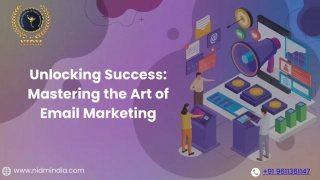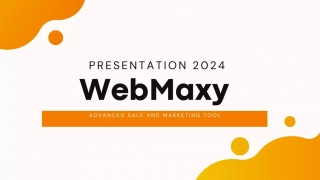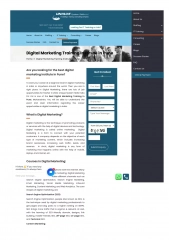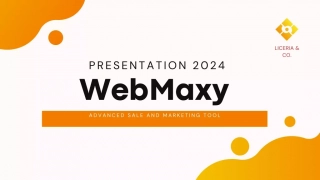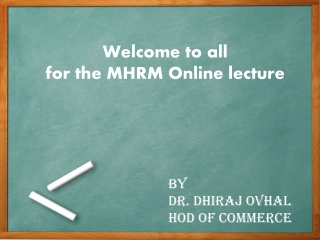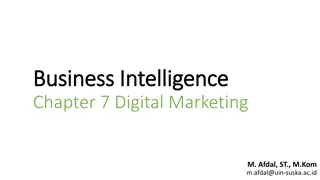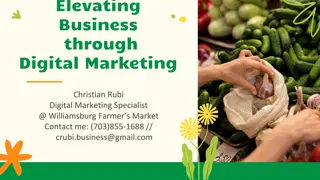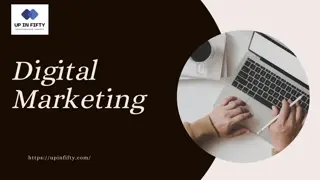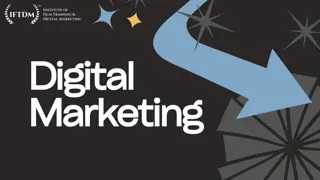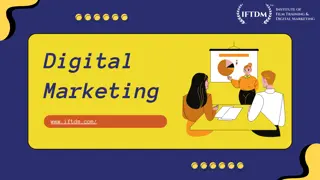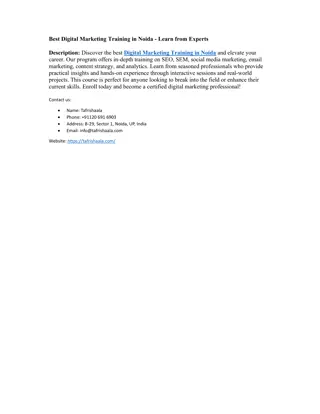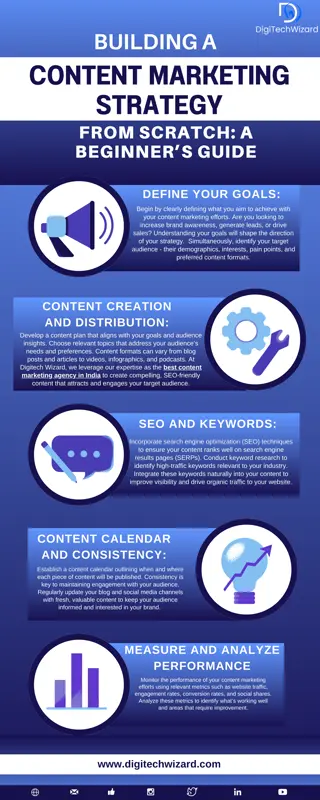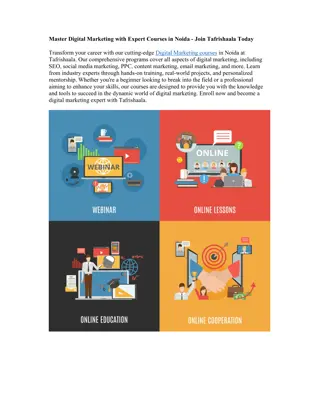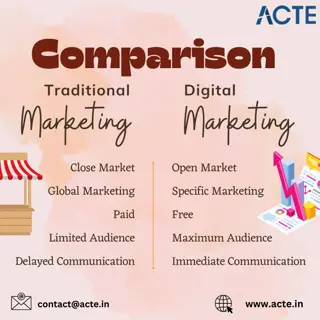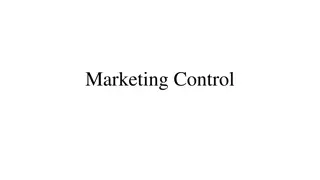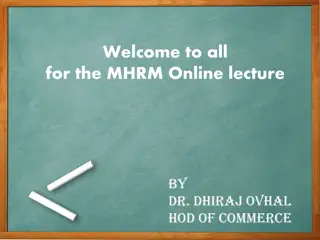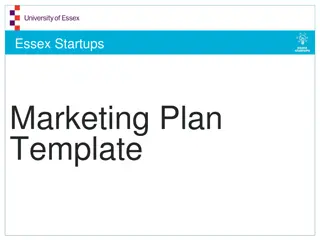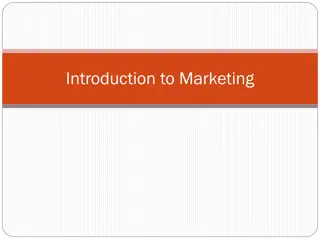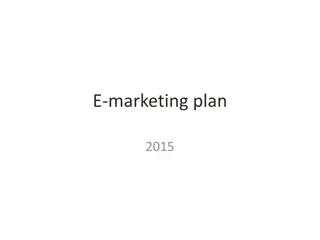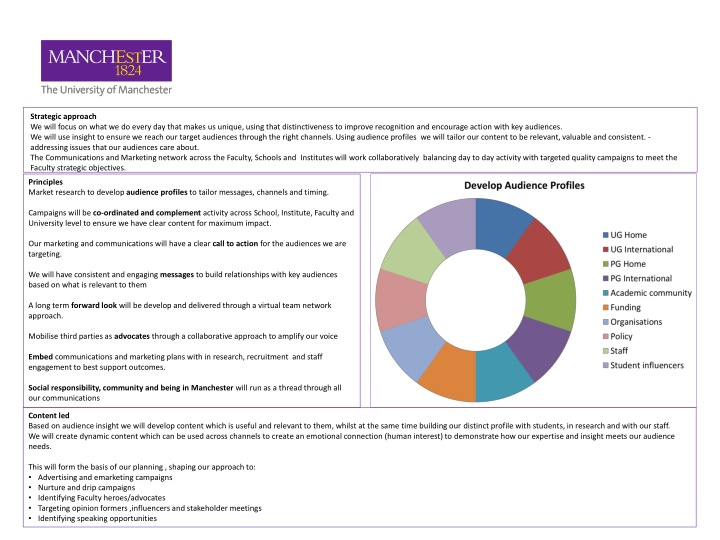
Unique Strategic Approach to Enhance Recognition and Engagement
Leveraging our distinctive qualities, we will tailor content to resonate with key audiences and drive meaningful action. Through market research, coordinated campaigns, and engaging messages, we aim to elevate our profile and foster partnerships across various sectors. By focusing on audience insights, we will create dynamic content that forges emotional connections and positions us as a hub of expertise and innovation.
Download Presentation

Please find below an Image/Link to download the presentation.
The content on the website is provided AS IS for your information and personal use only. It may not be sold, licensed, or shared on other websites without obtaining consent from the author. If you encounter any issues during the download, it is possible that the publisher has removed the file from their server.
You are allowed to download the files provided on this website for personal or commercial use, subject to the condition that they are used lawfully. All files are the property of their respective owners.
The content on the website is provided AS IS for your information and personal use only. It may not be sold, licensed, or shared on other websites without obtaining consent from the author.
E N D
Presentation Transcript
Strategic approach We will focus on what we do every day that makes us unique, using that distinctiveness to improve recognition and encourage action with key audiences. We will use insight to ensure we reach our target audiences through the right channels. Using audience profiles we will tailor our content to be relevant, valuable and consistent. - addressing issues that our audiences care about. The Communications and Marketing network across the Faculty, Schools and Institutes will work collaboratively balancing day to day activity with targeted quality campaigns to meet the Faculty strategic objectives. Principles Market research to develop audience profiles to tailor messages, channels and timing. Campaigns will be co-ordinated and complement activity across School, Institute, Faculty and University level to ensure we have clear content for maximum impact. Our marketing and communications will have a clear call to action for the audiences we are targeting. We will have consistent and engaging messages to build relationships with key audiences based on what is relevant to them A long term forward look will be develop and delivered through a virtual team network approach. Mobilise third parties as advocates through a collaborative approach to amplify our voice Embed communications and marketing plans with in research, recruitment and staff engagement to best support outcomes. Social responsibility, community and being in Manchester will run as a thread through all our communications Content led Based on audience insight we will develop content which is useful and relevant to them, whilst at the same time building our distinct profile with students, in research and with our staff. We will create dynamic content which can be used across channels to create an emotional connection (human interest) to demonstrate how our expertise and insight meets our audience needs. This will form the basis of our planning , shaping our approach to: Advertising and emarketing campaigns Nurture and drip campaigns Identifying Faculty heroes/advocates Targeting opinion formers ,influencers and stakeholder meetings Identifying speaking opportunities
Raising our Profile Students and staff recognise us as the University of choice for teaching, student experience and research. We are relevant and distinct. We set the agenda in our priority areas. Strategy We will use audience insight to develop content and convey what makes us distinct. We will focus on supporting student recruitment and conversion to meet the Faculty targets. We will develop a series of campaigns linked to our Faculty, School and Institute priorities. These will be embedded within the external context to make sure they are relevant and timely. We will develop a plan of internal/external engagement activity for our leadership team, key academics and staff to support the development of partnerships, target student influencers and establish third party advocacy and awareness Audience Goal Messaging Students/Student influencers We are recognised as the university of choice for humanities subjects , delivering quality teaching by leading experts. Students experience is rated highly throughout their time at University Our courses stretch and challenge our students to achieve, investing in them academically and developing their skills ready for their chosen career or future study. Staff We are seen as an employer of choice. Our staff feel valued, with development opportunities and a focus on wellbeing. We share best practice and create a culture of ambition with our staff. We offer a clear career path for academics and professional support services, giving opportunities for development and diversification within a supportive environment. Academic community Boost our reputation and reach based on quality research capabilities, supporting quality student and staff recruitment and diversification. We are bringing together expert knowledge and insight to conduct pioneering research which influences policy and makes a difference to peoples lives. Organisations Greater awareness of collaboration opportunities Through partnerships and collaborations your organisation can access our research expertise in order to help you overcome complex challenges. Policy Increased engagement with our experts and research Our applied research informs and develops policy that helps governments tackling some of the biggest problems facing the world. Funding bodies Boost our reputation and reach based on quality research capabilities, attracting funding as well as supporting quality student and staff recruitment and diversification. We have a strong record of success producing high-quality research that delivers solutions to peoples lives.
Research Student Experience Our People Our staff feel valued and engaged, with a clear link between their work and the vision for the Faculty. Staff have ownership of their development and wellbeing is prioritised. Staff are advocates for the School, Faculty and University. We are recognised as the university of choice for humanities subjects focused on what makes Manchester distinct and the opportunities of the city as well as our courses. Our research is world class. We are recognised as leading the way in our priority areas. We influence policy and make a difference to peoples lives. Our research is relevant to our audiences and meets their needs. Strategy We will support the delivery of the University engagement strategy. Strategy We will support recruitment and conversion activities through a content led strategy to improve the quality of our students, increase international numbers and diversity, support increased PG targets and maintain students as advocates after graduation. Strategy We will engage with key audiences to enhance our research reputation and support real life impact by raising our profile which in turn will support opportunities to secure more funding. We will involve our people in developing solutions through engagement opportunities. Researchers will be at the heart of what we do. We will achieve this through consultation collaboration and partnership. We will use our staff to tell our story showcasing investment in staff and developing our culture and values. Priorities courses and activity will be agreed with schools in May each year for the following Sept intake. We will identify what makes us distinct, developing a core narrative and messaging framework for these areas based on audience profiles. Our communications will embed a sense of community helping staff to make the link between their role and how it links directly to our ambitions. We will use market insight, application, accepter and decliner data to develop our campaigns and influence our priority areas. This includes geographical international targeting and a focus on student influencers. We will develop a themed approach to showcase our areas of expertise, knowledge and legacy. We will create and contribute to conversations which are relevant today and for the future We will work to support a positive and progressive culture in line with our aspirations. Building on the Our Story project we will develop a distinct narrative and messaging for our schools and institutes, supporting this with rich content based on audience profiles. We will improve quality and visibility of our content to increase opportunities to see what we are doing Pure, Wikipedia, our website, google scholar, social media, the Conversation. This will support citations and impact. We will review internal channels across Faculty, School and institutes to see how they work together to have better impact. We will develop a campaign and stand out creative on what it s like to be a student in humanities using existing students and alumni . Our external communications activity will be amplified through our internal engagement. Develop a list and plan for our renowned academics to support our themed approach and get recognition of our subject matter experts. We will work with the leadership team to improve their visibility and articulate their vision at all levels We will investigate activities to reach and nurture our audiences through recruitment and conversion including offer holder events and webchats, buddying, attending teacher conferences and hosting high flyer sessions. We will support Institutes to promote what they do internally and encourage greater collaboration across the Faculty and the University We will lead on developing communications to help staff understand who does what, helping them to find their way round the organisation and build supportive networks. Our communications will embed a sense of community and academic rigour with students before and during their time with us.
Suggested Themes Poverty/Income Global development GDI Gender Race Devolution Austerity Radicalisation Education opportunities Domestic abuse Migration Creative Manchester City of Literature, Festivals In place of war JRRI Plays and politics Cultural assets Legal tech/Fintech British election survey Race and ethnicity Confidentiality/Privacy CMI Big data Smart and sustainable cities Infrastructure investment decisions Legal challenges MUI SCI Inequalities and diversity Creative Digital and data Sustainability Disaster response Manchester and community Workplace and stress Dementia clinic Ethics Gentle carers Bad bosses Ebola HCRI Ethnicity and mental health Social justice Miscarriages of justice Legal advise centre Black lawyers matter Justice and civil war Regulation Brexit Criminology in prisons Multi-lingual Manchester Care services and ageing Ageing and everyday life Urban ageing Inequalities and ageing Public Health and Ageing Global ageing HCRI Spontaneous response to emergencies Flood alleviation Work and Justice Disaster response Ageing Health There will still be a clear focus on marketing for student recruitment and admissions linked to courses. The themes will provide an extra layer of content, picking out the areas which make us distinct. The themes are interlinked and overlap. This approach will complement, not replace the Global Inequalities Beacon.
Marketing and Communications support across the Faculty Training courses Templates Why work with the media? Enews templates Media training Brand Ambassadors Publication templates Why blog? Marketing toolkit Engaging with policy makers for research impact Research and Survey Media/policy Market research Staff feedback/survey results External stakeholder survey 2019 AMBS external stakeholder survey League Tables DHLE NSS Media coverage and key message penetration Policy engagement and influence Evaluation People Digital Attendance and feedback from events Quality of applications and admissions Third party advocacy Google analytics User testing Social media analytics Citations stats Altmetrics
Channel strategy will be informed by audience profiles and content led approach Further develop relationship with The Conversation to support citations and awareness, as well as positioning for thought leadership and impact. Identify and prioritise trade, print and broadcast based on audience profiles. Evaluate the demand for publications and leaflets. Ensure that publications are considered as part of wider communications and marketing plan, not stand alone. Investigate software to pull online content to generate publications which can be bespoke and up to date for audiences and reduce duplication of work. Media Review existing web and social media channel in terms of structure, platform, content and reach for our audience profiles. Dynamic digital content by default. Content should be relevant and easy to navigate, highlighting our distinctiveness Publications Digital Channels Maximise content gathering from our own events Seek out speaking opportunities Co-ordinate events to reduce risk of clashes Identify events to attend as delegates to reach influencers Events and conferences Emarketing Improve and invest in personalised content Use audience profiles to develop engaging and relevant content at the right time in the decision cycle Stakeholder Advertising Develop clear priorities and plan activity to target influencers and third advocates Used in conjunction with attendance at events and conferences. Display advertising used on the right channels to reach the right audiences. Advertising is supported by online content drawing audiences in to find out more, developing the audience journey.
Structure and resources Current structures across Institutes, Schools and Faculty need to be reviewed to deliver this. Need to build more flexible structure to work as a virtual team. Research communications are currently fragmented with only one permanent member of staff and pockets of dedicated resource in schools and institutes leading to disparity. Improve ways of working with media team and social media champions in schools/institutes. Support for admissions should be reviewed in line with SMRA review recommendations. Limited cross discipline capacity in current structure Need to review budgets and activity to ensure we can cover the cost and time needed to carry out audience profiling and campaign delivery. Team skills and development Digital Marketing Evaluation Campaign planning Knowledge networks Establish best practice forums to support all those involved in communications and marketing across Faculty, Schools and Institutes. Collaboration with other Faculties, Division Communications and Marketing, DSE, DDAR. Look at what is going on at other Universities and outside of the HE sector to keep our skills up to date. Make sure the Communications and Marketing team has knowledge of what is going on at a strategic level across the Faculty, Schools and Institutes. Governance DAG/HPRC Faculty Communications and Marketing Leadership Team Communications and Marketing Group AMBS SALC SEED Law SoSS Communications and Marketing Group Communications and Marketing Group Communications and Marketing Group Commuincations and Marketing Group Communications and Marketing Group


